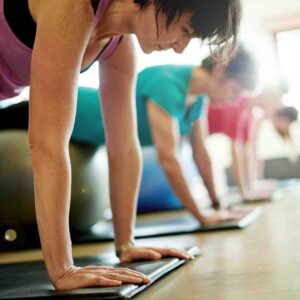Table of Contents
Introduction
Increased Mobility
Improved Core Stability
Injury Prevention and Better Posture
Q&A
Conclusion
Pilates strengthens your core, posture, and well-being.
Introduction
Pilates improves posture, core strength, and flexibility. All ages and fitness levels can undertake this low-impact workout. Pilates improves balance, stress, muscle tone, and coordination. It reduces back pain and boosts body awareness.
Increased Mobility
Pilates is growing popularity. This low-impact workout targets core strength, posture, and flexibility. Pilates has many health and fitness benefits and is a perfect addition to any training plan.
Pilates improves flexibility and mobility. Pilates helps develop flexibility by stretching and lengthening muscles. Pilates improves joint mobility, reducing injury risk and improving movement.
Slow, regulated Pilates exercises stretch deeper and increase range of motion. Weightlifting and running are more high-impact and may not emphasise flexibility.
Pilates improves balance, coordination, and flexibility. Pilates movements demand core muscular engagement and precise alignment, which can enhance balance and coordination.
Pilates also reduces stress and tension. Pilates exercises are low-impact and gentle on the body, reducing muscle tension and promoting relaxation. Pilates breathing exercises can relieve tension and calm you.
Pilates improves posture too. Pilates strengthens the core, which improves posture and alignment. Pilates can relieve back discomfort and increase spinal mobility, improving posture and reducing injury risk.
Pilates improves health and fitness. This low-impact workout improves flexibility, balance, coordination, and posture. Pilates can also relieve stress and tension, improving your general health.
Pilates has several alternatives. Pilates can be done at home or in a gym. To avoid injury and maximise Pilates benefits, start cautiously and progressively increase workout intensity.
Finally, Pilates improves health and fitness. It improves flexibility, balance, coordination, posture, and stress relief. Pilates is a low-impact workout that can improve your health.
Improved Core Stability
Pilates is growing popularity. This low-impact workout targets core muscles. Core muscles comprise abdominals, back, and hips. Pilates boosts fitness and health. Pilates improves core strength and stability.
Pilates improves core strength and stability. Core muscles assist and maintain posture. Weak muscles cause back pain and bad posture. Pilates strengthens them.
Pilates is slow and deliberate. This helps you concentrate and activate the right muscles. This ensures core muscular work. Pilates breathing techniques activate the core even more.
Pilates also improves balance. Pilates uses unstable surfaces like Pilates balls and foam rollers. Balance requires core muscular engagement. This builds core strength and stability.
Pilates increases flexibility. Pilates stretches and lengthens muscles. This enhances mobility. Flexibility improves fitness and reduces injury risk.
Pilates helps mental health too. Pilates requires concentration. This reduces tension and improves concentration. Pilates breathing exercises relieve anxiety and relax.
Pilates boosts core strength and stability. Pilates targets core muscles to enhance posture, back discomfort, and fitness. Pilates improves balance, flexibility, and mental health. Pilates is a great low-impact activity for improving health and fitness.
Injury Prevention and Better Posture
Pilates is growing popularity. This low-impact workout strengthens core muscles, improves flexibility, and raises body awareness. Pilates improves fitness and reduces injury risk. Pilates can improve posture and reduce injury risk.
Pilates improves posture. Poor posture causes back, neck, and headaches. Pilates improves posture by strengthening spine-supporting muscles. Strengthening your core muscles improves balance and stability, preventing falls and other accidents.
Pilates reduces injury risk. Pilates is low-impact, making it safer than jogging or leaping. Pilates emphasises perfect form and alignment to prevent technique-related injuries. Muscle strains and other injuries can be reduced by strengthening and stretching.
Pilates also boosts fitness. Pilates targets the core, arms, legs, and back. Pilates boosts strength, flexibility, and endurance. Pilates can help you lose weight and tone your muscles, improving your appearance and confidence.
Pilates can also improve mental wellness. Pilates is often done in a serene setting, which reduces stress and anxiety. Pilates involves concentration and focus, which improves brain clarity and cognitive function. Pilates improves health and quality of life.
There are certain things to consider before attempting Pilates. First, hire a skilled instructor to coach you through the exercises and ensure perfect form and technique. Start with simple exercises and progress to advanced ones. Finally, listen to your body and prevent overexertion to avoid damage.
Pilates improves mental and physical wellbeing. Pilates can improve your posture, core strength, and injury risk for a better, happier existence. Start with beginner-level Pilates movements with a competent instructor. This popular exercise might be beneficial with practise.

Q&A
1. Why is Pilates healthy?
Pilates improves flexibility, balance, posture, and core strength. It also reduces physical stress.
2. Does Pilates help lose weight?
Answer: Pilates increases metabolism by building muscle. It helps lose weight by burning calories and fat.
3. Can Pilates improve mental health?
Answer: Pilates reduces stress and anxiety, improving mental wellness. Mindfulness and relaxation boost mental health.
Conclusion
Pilates builds core strength, flexibility, and body awareness. It helps posture, tension, and back pain. Pilates improves physical and mental health.


